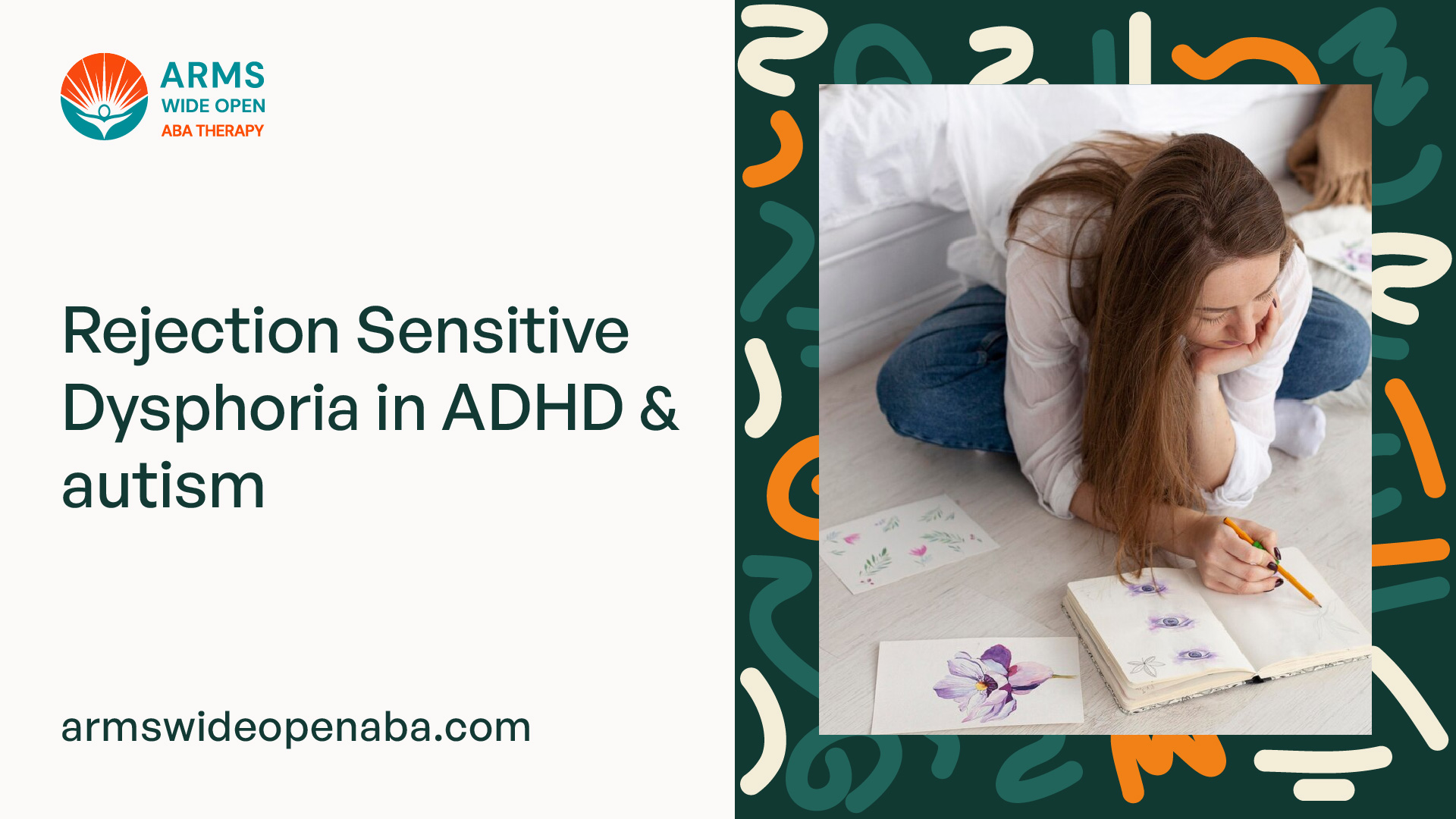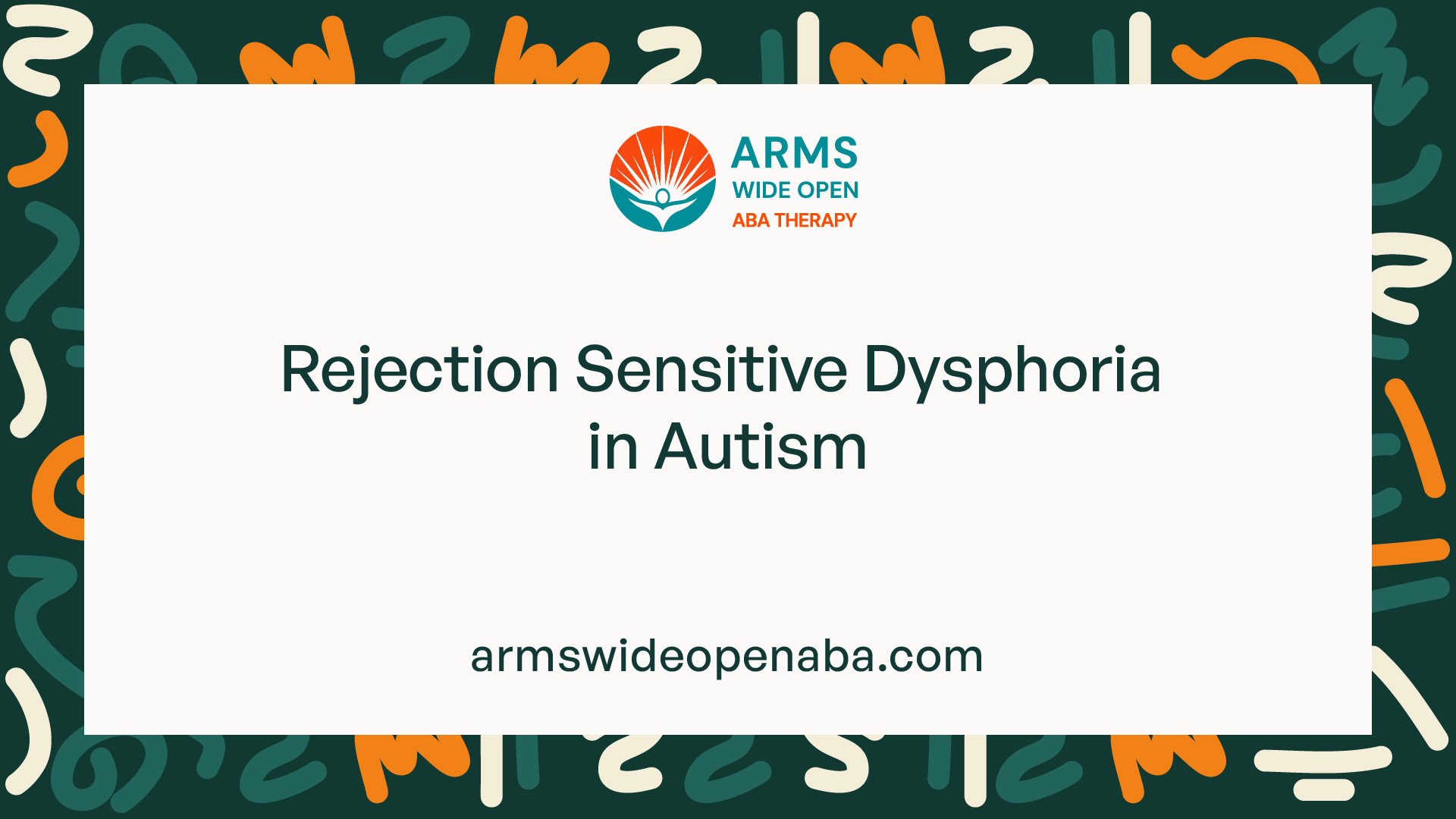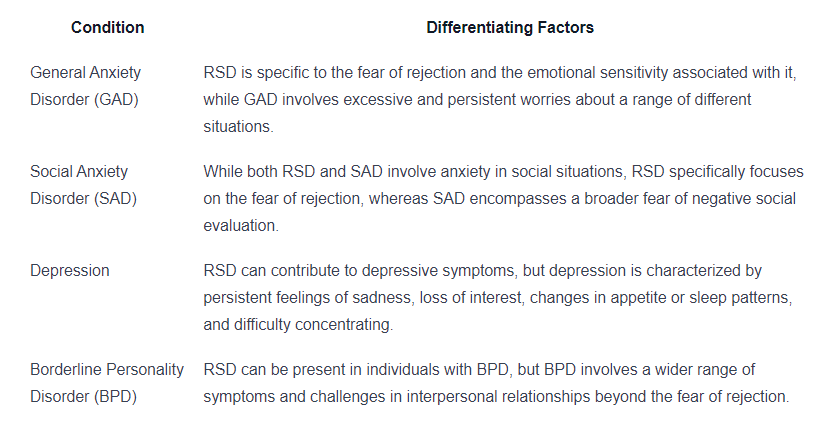Rejection Sensitive Dysphoria in ADHD & autism
Demystifying rejection sensitive dysphoria in ADHD and autism. Understand the impact and discover coping strategies for support.


Understanding Rejection Sensitive Dysphoria
Rejection Sensitive Dysphoria (RSD) is a psychological phenomenon that can occur in individuals with ADHD and Autism. It is characterized by an intense emotional response to perceived or actual rejection, criticism, or failure. Understanding the definition and manifestations of Rejection Sensitive Dysphoria is essential in recognizing and supporting those who experience it.
Definition of Rejection Sensitive Dysphoria
Rejection Sensitive Dysphoria is a term used to describe the emotional response and sensitivity that individuals with ADHD or Autism may experience in relation to rejection or criticism. It is not officially recognized as a separate diagnosis in the Diagnostic and Statistical Manual of Mental Disorders (DSM-5), but it is commonly observed in clinical practice.
How Rejection Sensitive Dysphoria Manifests
The manifestations of Rejection Sensitive Dysphoria can vary among individuals, but common experiences include:
- Emotional Intensity: Individuals may experience intense emotional distress, such as sadness, anger, or anxiety, in response to perceived or actual rejection, criticism, or failure.
- Hyperawareness of Others' Opinions: There is often an excessive focus on others' opinions and a heightened sensitivity to even subtle signs of disapproval or rejection.
- Avoidance Behaviors: To cope with the fear of rejection or criticism, individuals may engage in avoidance behaviors, such as avoiding social situations, academic or professional challenges, or even personal relationships.
- Negative Self-Perception: Rejection Sensitive Dysphoria can contribute to low self-esteem and negative self-perception. Individuals may internalize perceived failures or rejections, leading to self-doubt and a diminished sense of self-worth.
It is important to note that Rejection Sensitive Dysphoria can significantly impact an individual's daily functioning, relationships, and overall well-being. Recognizing and addressing this emotional sensitivity is crucial in providing appropriate support and intervention for individuals with ADHD or Autism who experience Rejection Sensitive Dysphoria.
Rejection Sensitive Dysphoria in ADHD
Rejection Sensitive Dysphoria (RSD) is a phenomenon that often coexists with Attention Deficit Hyperactivity Disorder (ADHD), impacting individuals who experience it in various ways. Understanding the relationship between ADHD and Rejection Sensitive Dysphoria can shed light on the challenges faced by individuals with both conditions.
Relationship between ADHD and Rejection Sensitive Dysphoria
Research suggests a strong correlation between ADHD and Rejection Sensitive Dysphoria. Many individuals with ADHD experience heightened emotional sensitivity and have a greater propensity to feel rejected or criticized, leading to the development of RSD symptoms.
ADHD often affects the regulation of emotions and impulsivity, making individuals more susceptible to intense emotional responses triggered by perceived rejection or criticism. The presence of ADHD-related executive function deficits, such as difficulty with emotional regulation and impulse control, can exacerbate the emotional intensity experienced in Rejection Sensitive Dysphoria.
Impact of Rejection Sensitive Dysphoria on Individuals with ADHD
For individuals with ADHD, Rejection Sensitive Dysphoria can have a significant impact on their daily lives. The emotional intensity associated with RSD can lead to various challenges, including:
- Impaired Self-Esteem: Repeated experiences of perceived rejection or criticism can negatively impact an individual's self-esteem, leading to feelings of inadequacy and self-doubt.
- Avoidance Behaviors: Fear of rejection can lead individuals with RSD to avoid situations that may trigger their sensitivities. This avoidance can hinder social interactions, limit opportunities for growth, and impact overall well-being.
- Interpersonal Difficulties: The emotional intensity of RSD can strain relationships as individuals may react strongly to perceived criticism or rejection, causing misunderstandings and conflicts.
- Distress and Anxiety: RSD can contribute to heightened levels of distress and anxiety in individuals with ADHD, impacting their mental health and overall quality of life.
Understanding the relationship between ADHD and Rejection Sensitive Dysphoria is crucial for individuals, their loved ones, and healthcare professionals. By recognizing the impact of RSD on individuals with ADHD, appropriate support and interventions can be provided to help manage the emotional challenges associated with these conditions.

Rejection Sensitive Dysphoria in Autism
Individuals with autism often experience various challenges in social interactions and emotional regulation. One such challenge is the presence of rejection sensitive dysphoria (RSD). In this section, we will explore the relationship between autism and rejection sensitive dysphoria, as well as the impact it can have on individuals with autism.
Relationship between Autism and Rejection Sensitive Dysphoria
Research suggests that there is a significant overlap between autism and rejection sensitive dysphoria. While rejection sensitive dysphoria is not exclusive to individuals with autism, it appears to be more prevalent among those on the autism spectrum. The exact mechanisms behind this relationship are still being studied, but it is believed that the social and emotional difficulties faced by individuals with autism may contribute to the development and intensification of rejection sensitive dysphoria.
Impact of Rejection Sensitive Dysphoria on Individuals with Autism
Rejection sensitive dysphoria can have a profound impact on the lives of individuals with autism. The fear of rejection and criticism can lead to heightened emotional sensitivity and intense emotional responses to perceived rejection. This can manifest as feelings of sadness, anger, or anxiety, often triggered by seemingly minor social interactions or perceived slights.
The impact of rejection sensitive dysphoria on individuals with autism can be far-reaching. It can affect their social relationships, self-esteem, and overall well-being. The fear of rejection may lead to avoidance of social situations, withdrawal from relationships, or difficulties in forming new connections. It can also contribute to increased stress and anxiety, making it challenging for individuals with autism to navigate the complexities of social interactions.
Understanding the presence of rejection sensitive dysphoria in individuals with autism is crucial for providing appropriate support and intervention. By recognizing and addressing the emotional sensitivities and challenges associated with rejection, it becomes possible to create a more supportive and inclusive environment for individuals with autism.
In the next section, we will explore the common signs of rejection sensitive dysphoria and discuss strategies for managing and coping with this condition for individuals on the autism spectrum.
Recognizing Symptoms
When it comes to understanding and addressing rejection sensitive dysphoria (RSD) in individuals with ADHD and autism, recognizing the symptoms is a crucial step. By identifying these signs, individuals and their support systems can better navigate and manage the challenges associated with RSD. Here, we will explore the common signs of rejection sensitive dysphoria and how to differentiate it from other conditions.
Common Signs of Rejection Sensitive Dysphoria
Rejection sensitive dysphoria can manifest in various ways and may differ from person to person. However, there are several common signs to look out for when trying to identify RSD:
- Heightened Emotional Sensitivity: Individuals with RSD may experience intense emotional reactions to perceived or actual rejection. These emotions can include sadness, anger, anxiety, and even suicidal thoughts.
- Fear of Rejection: Individuals may exhibit a strong fear of rejection and may go to great lengths to avoid situations that they perceive as potentially leading to rejection.
- Hyperawareness of Social Cues: People with RSD may be highly attuned to social cues and interpret them as signs of rejection, even when they may not be.
- Self-Isolation: Due to their fear of rejection, individuals with RSD may withdraw from social interactions and isolate themselves to protect themselves from potential emotional pain.
- Self-Doubt and Low Self-Esteem: RSD can lead to feelings of inadequacy and self-doubt. Individuals may struggle with low self-esteem, even if they have significant accomplishments or positive feedback from others.
How to Differentiate Rejection Sensitive Dysphoria from Other Conditions
It's important to differentiate rejection sensitive dysphoria from other conditions that may exhibit similar symptoms. Here are some key factors to consider when distinguishing RSD from other conditions:

Understanding the distinct signs and differentiating factors of rejection sensitive dysphoria can help individuals, their loved ones, and healthcare professionals accurately identify and address this specific condition. By recognizing these symptoms and differentiating them from other conditions, targeted support and interventions can be implemented to alleviate the impact of RSD on individuals with ADHD and autism.
Coping Strategies
Rejection Sensitive Dysphoria can be challenging to navigate, but there are various coping strategies that can help individuals manage its impact on their daily lives. By implementing these techniques and seeking professional support, individuals with ADHD and autism can better cope with Rejection Sensitive Dysphoria.
Techniques for Managing Rejection Sensitive Dysphoria
Managing Rejection Sensitive Dysphoria involves developing strategies to alleviate the emotional distress caused by perceived rejection or criticism. Here are some techniques that can be helpful:
- Self-awareness and Mindfulness: Developing self-awareness can help individuals recognize triggers and early signs of Rejection Sensitive Dysphoria. Practicing mindfulness techniques, such as deep breathing or meditation, can also help in calming the mind during moments of distress.
- Cognitive Behavioral Therapy (CBT): CBT can be an effective therapeutic approach for managing Rejection Sensitive Dysphoria. It focuses on identifying and challenging negative thought patterns and replacing them with more positive and realistic ones.
- Stress Reduction Techniques: Engaging in stress-reducing activities, such as exercise, yoga, or hobbies, can be beneficial in managing the emotional intensity associated with Rejection Sensitive Dysphoria. These activities can help channel emotions in a healthy way and promote overall well-being.
- Social Skills Training: Learning and practicing effective communication and social skills can help individuals navigate social situations more confidently. This can include assertiveness training, active listening, and conflict resolution techniques.
- Building a Support Network: Surrounding oneself with a supportive network of friends, family, or support groups can provide a safe space to share experiences and receive emotional support. Having someone to talk to during difficult times can help alleviate feelings of rejection.
Seeking Professional Help and Support
In addition to self-help strategies, seeking professional help is essential for individuals experiencing Rejection Sensitive Dysphoria. Mental health professionals, such as psychologists or psychiatrists, can provide guidance and support tailored to individual needs. They can offer therapies, such as CBT or dialectical behavior therapy (DBT), that specifically address emotional dysregulation and Rejection Sensitive Dysphoria symptoms.
It's important to remember that everyone's experience with Rejection Sensitive Dysphoria is unique, and the coping strategies that work will vary from person to person. Finding the right combination of techniques and support may take time and experimentation. By seeking professional help and employing effective coping strategies, individuals can develop resilience and lead fulfilling lives despite the challenges posed by Rejection Sensitive Dysphoria.

Creating a Supportive Environment
When it comes to individuals with rejection sensitive dysphoria (RSD) in ADHD and autism, creating a supportive environment is crucial for their emotional well-being. Understanding their unique experiences and providing empathy can make a significant difference in their lives. Here are some tips for family and friends to help create a supportive environment for individuals with RSD.
Tips for Family and Friends
Support from loved ones plays a key role in helping individuals with RSD navigate their challenges. Here are some tips for family and friends:
- Educate Yourself: Take the time to learn about rejection sensitive dysphoria, ADHD, and autism. Understanding the conditions can help you empathize with their experiences and offer appropriate support.
- Be Patient and Nonjudgmental: It is important to be patient and understanding when interacting with someone with RSD. Avoid making quick judgments or dismissing their emotions. Validate their feelings and provide a safe space for them to express themselves.
- Listen and Validate: Actively listen to their concerns and feelings without interrupting or dismissing them. Validate their experiences and emotions, acknowledging that their struggles are real and valid.
- Be Mindful of Triggers: Be aware of their triggers and avoid situations that may exacerbate their RSD symptoms. Consider discussing potential triggers and finding ways to minimize their impact together.
- Communicate Openly: Maintain open and honest communication. Encourage them to express their needs, fears, and concerns. Create a safe space where they feel comfortable discussing their emotions without judgment or criticism.
Building Understanding and Empathy
Building understanding and empathy is essential for creating a supportive environment for individuals with RSD. Here are some ways to foster empathy:
- Educate Others: Share information about RSD, ADHD, and autism with friends, colleagues, and other family members. Help others understand the challenges faced by individuals with RSD, promoting empathy and reducing stigma.
- Practice Active Empathy: Put yourself in their shoes and try to understand their perspective. Reflect on how their experiences may differ from your own. This can help you respond with greater empathy and sensitivity.
- Be Mindful of Language: Use inclusive and respectful language when discussing RSD, ADHD, and autism. Avoid stigmatizing or derogatory language that may perpetuate misunderstandings or stereotypes.
- Offer Support: Show your support by offering assistance when needed. This could include helping with tasks that may be more challenging for them, providing emotional support during difficult times, or simply being there to listen when they need to talk.
- Encourage Self-Care: Encourage self-care practices and activities that promote well-being. Help them identify coping strategies that work for them and support their efforts to prioritize their mental health.
By implementing these tips and fostering empathy and understanding, you can create a supportive environment that enables individuals with RSD in ADHD and autism to thrive and feel understood.
Sources
https://embrace-autism.com/rejection-sensitive-dysphoria-in-adhd-and-autism/
https://www.verywellmind.com/what-to-know-about-autism-and-rejection-sensitive-dysphoria-7097539
Similar articles
We’re here to help you

Our team is here to assist you in this process. Contact us for any assistance.
it’s easy to apply
We Accept Most Insurances
Our in-network insurance partnerships make ABA therapy more accessible to families throughout our service areas.







Our Insurance Process
We'll request your insurance details to help us verify your plan's coverage for ABA therapy. Once we've received this information, we'll walk you through your benefits, including copayments, deductibles and out-of-pocket maximums, so you know what to expect in advance.
Our team will then handle the preauthorization and all the necessary paperwork.
.svg)





















.jpeg)


































.jpeg)




.jpeg)







.jpeg)











.jpeg)















